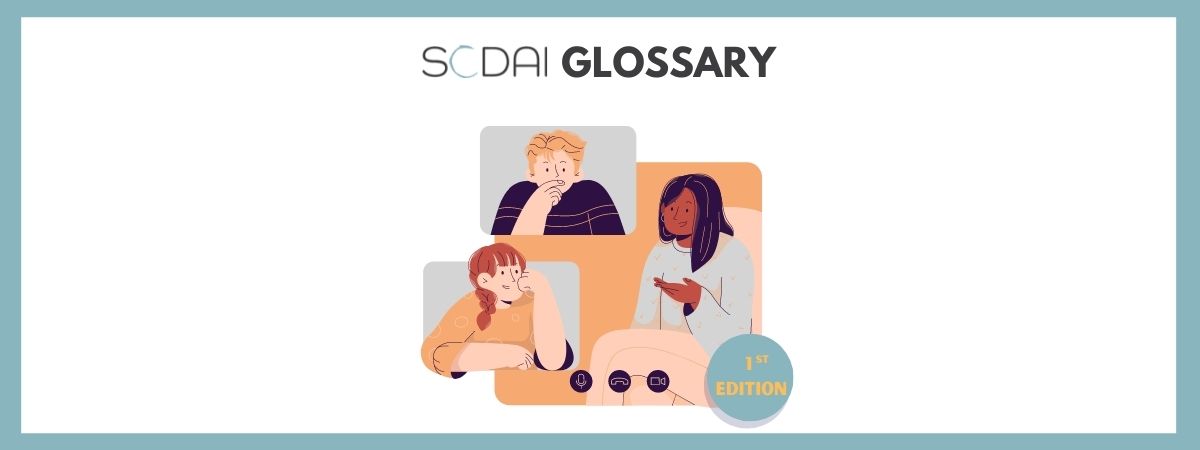
Language is one of the most crucial aspects of living together as a society. It is one of the most important tools we have to interact with one another and it can create a large impact on whether or not we feel welcome and included. However, inclusive language goes beyond just the words we use. It is a continuous reminder of our deeply rooted biases and prejudices against others.
As an organization, assuming everyone in your organization knows and uses the most inclusive terminology, puts underrepresented groups at risk of verbal exclusion. Having an organization-wide glossary can help eliminate knowledge gap barriers within your organization and ensure your internal and external communication enables an inclusive environment.
The key to a good glossary, aside from being inclusive, is continuous maintenance. We continue to learn more about underrepresented individuals and groups, so let's keep upgrading our glossaries to match our new knowledge.
BIPOC
Afro- or African Diaspora
This term is used to describe ethnic groups of the African Diaspora. The scattered population whose origin lies in Africa E.g. Afro-Caribbean.
Anti-Racism
Anti-racism is what we describe as the antonym of racism. We believe that simply "not racist" is insufficient and unattainable due to the large racial disparity.
BIPOC
Black, Indigenous & People of Color. We use this as a general term for racially and ethnically diverse groups. BIPOC or POC is not meant to replace specific races, voice, or history. In all times it is encouraged to be specific when referring to a specific group.
Black & Brown
While black people (technically) do have brown-colored skin, black and brown are two entirely different affinity groups. Black refers to peole of African Diaspora, while brown refers to a group of people with brown skin, but not of the African Diaspora. E.g. a brown person from India. Both groups are POC.
Racism
Exclusion and Discrimination against BIPOC people is described as racism.
LGBTQIA+
Cisgender
LGBTQIA+
Lesbian, Gay, Transgender, Queer, Intersex, Asexual and the "+" represents the broader spectrum of sexual orientation and identity.
Sexual Orientation
Sexual orientation describes the pattern in our romantic and/or sexual attraction. We shouldn't use sexual identity as a synonym for sexual orientation. Sexual orientation is a part of your sexual identity, not its entity.
Queer
Queer is the umbrella term we use to describe the spectrum of sexual orientations aside from heterosexual. Note: not everyone is comfortable being refered to as queer. Always ask first
Gender & Identity
Avoid "Girls"
Women above 18 years old are women not girls. Using girls or ladies can in many cases come across as patronizing.
Gender-Neutral
We use gender-neutral terms and words. E.g. instead of a businessman, we use a business executive.
Gender Roles
We avoid language & visual communication that promotes gender roles.
Pronouns
We introduce ourselves with our pronouns and we never assume a person's gender identity and pronouns in our communication. In the case pronouns are unknown, we use they/them.
Women, Men & People
Female and male are adjectives that describe a person, animal, or plant's ability to reproduce. Gender goes beyond one's ability to reproduce. Additionally, it dismisses non-binary people.
Nationality
Colonized
We don't refer to countries as "part of" the country that colonized them. They are colonized territories.
Country Specific
We use a specific country to describe a person's nationality. If unknown, we ask. E.g. "She is from Vietnam", instead of "She is Asian"
Western and Southern
We don't use developed vs. underdeveloped or 1st world vs 3rd world. These terms are biased to what is defined as underdeveloped and remove accountability from Western countries.
Religion
Holidays
We use holidays as an umbrella term to generalize all religious holidays/festivities.
House of Worship / Religious Entity
Not all religious groups attend a "church".
Disability
Ableism
Term to describe the exclusion and discrimination of people with a disability.
Avoid Victimhood
We don't use language that implies that people with disabilities are victims of their disabilities. E.g. Suffers from a hearing disability.
Mental Health
An umbrella term to describe the state of emotional and psychological well-being. Not synonymous for neurodiversity.
Neurodiversity
We use Neurodiversity to describe people's neurological deviations. E.g. Bipolarity, OCD, Epilepsia etc.
People First Language (PFL)
We use PFL when speaking about disability. E.g. A person with a walking disability. Note: Some groups prefer it the other way around. E.g. Autistic person (Ask first).
Underrepresented Groups
Affinity Group
Defines a group of people with a shared social identity.
Allyship
Describes the act of emphasizing, supporting and advocating the inclusion of underrepresented groups.
Amplify Voices
People have voices. The underrepresentation of groups dampens and neglects their voices, therefore we aim to amplify voices not give voices.
Underrepresented Group
Underrepresented describes individuals and groups whose needs are underrepresented in society. Marginalized is a good alternative, but it is less descriptive as to why and how individuals and groups are excluded.
Diversity
Describes the state of actively including individuals from a variety of [social] groups.
Inclusion
Describes the state of actively removing barriers to inclusion.
Privilege
Describes the state of having advantages because of the exclusion of others. Note: Privilege is layered and everyone is prone to some level of privilege.
[Provide] a Platform
See Amplify Voices. We aim to create a platform for underrepresented groups. This platform is synonymous with an environment or space to raise awareness and advocate for the removal of barriers.
Avoid "Minority"
We avoid the term minority as a synonym for underrepresented. While underrepresented groups are often minorities, not all minorities are underrepresented. E.g. White South Africans in South Africa.
